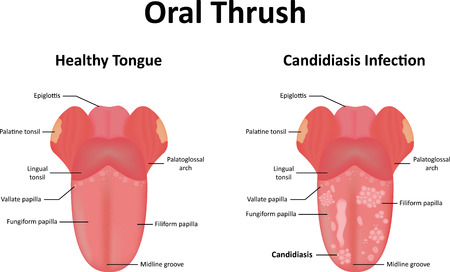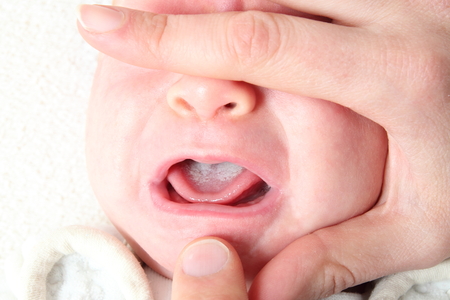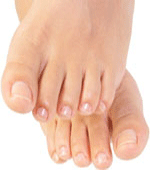What is Thrush?
Thrush is a fungal infection occurring in the mouth. It is also called as yeast thrush. It leads to the formation of white patches on the inner side of the cheeks. It is caused by a fungus called candida albicans. It can be the primary source of infection and lead to diaper rashes in babies and vaginal infections in females.
Thrush is seen most commonly in toddlers, newborn infants and individuals with a weakened immune system.

Causes of Thrush
The abnormal and excessive growth of candida albicans is responsible for causing thrush. In normal conditions there is some amount of fungus present on the skin and within the gastrointestinal tract. The good organisms within the body keep a check on all such bacteria and fungi. But at the time of an illness or stress, this balance is disrupted and excessive proliferation of the fungus occurs resulting in clinical infection called thrush.
Any condition that makes the immune system weak can also invite fungal infections. These include cancer treatments like chemotherapy and radiotherapy, HIV/AIDS, leukemia etc.
Diabetics who tend to have a higher amount of glucose in their blood are also more susceptible to getting fungal infections because the fungus proliferates in the presence of sugar.
Thrush pregnancy: If a pregnant lady has yeast infections then the infection can pass to the baby via the vaginal fluids at the time of delivery. This is the commonest cause of the infection in newborn babies. It makes feeding difficult and painful.
Risk Factors For Getting Thrush
Small babies and toddlers are the most prone to getting thrush. People who have a weakened immune system may get the fungal infection more easily as compared to others. Here are some risk factors that make you susceptible to the fungal infection
- HIV/AIDS
- Cancer treatment like chemotherapy and radiotherapy
- Use of dentures
- Cigarette smoking
- Organ transplant patients who are on immuno-suppressive drugs
- Antibiotics and cortico-steroids
Symptoms of Thrush
- In Adults: In the early few days there may be no symptoms, but within a week the patches will increase in size and give rise to discomfort. The signs and symptoms of thrush are:
- Whitish raised patches on the tongue,cheeks and palate
- Bleeding is the patch is scrapped
- Pain
- Difficulty in eating and swallowing
- Dryness and cracks on the corners of mouth
- In Infants: The oral thrush in infants leads to difficulty in breast feeding and so the child tends to refuse feeds. Irritability and crying are the symptoms seen in newborns.
- In Mothers: The yeast infection tends to pass from the mouth of the baby to the mother through the nipples during breast feeding. So the breast may get infected and the mother may have sharp severe pain in the breast during feeding, increased sensitivity of the nipples. The skin around the nipples also gets affected.The infection in the mother can pass on to the baby and vice versa so in all such cases, both the mother and the baby need to treated with anti fungal medication simultaneously to completely eradicate the fungus.
Diagnosis of Thrush
The diagnosis is done on the basis of symptoms of the patient and clinical examination. The mouth and the tongue will have white patches on them that are irregular in shape. Eating food may be difficult and painful especially in smaller kids and toddlers. If the infection is severe, a swab may be taken from the oral thrush patch and sent to the laboratory for analysis and detection of candida albicans.
If the infection spreads to the throat, then the confirmation of the diagnosis can be done by a throat swab or an endoscopy. An endoscope is a flexible instrument with a camera attached to its tip and it gives the image of the mucosa of the throat and esophagus to pinpoint the exact pathology.
Treatment of Thrush
The treatment for thrush is divided into two parts- home based and medical. The medical treatment includes-
Oral thrush medications include anti-fungal medicines like fluconazole and clotrimazole. Nystatin is a mouth wash that is specifically used fort fungal infections. You are supposed to hold the liquid in your mouth and then throw it away. In patients with HIV/AIDS, antifungal medicine called itraconazole is used.
At home you can try the following measures to relive the discomfort caused by the thrush.
- Using mouthwash oral thrush or mouth sprays can aggravate the lesions.
- Use a new tooth brush with soft bristles so that the mucosa does not get injured.
- Change your toothbrush once the infection is cured.
- Use a medicated gargle or salt water to rinse the mouth.
- Keep a check on the diabetes as fungi tend to proliferate in excess sugar environments.
- Have lots of yogurt without sugar to increase the number of good bacteria in the body.
For newborns, thrush treatment is slightly different. The mother and the child have to be treated simultaneously. The baby has to be given an antifungal medicine and the mother has to apply an anti-fungal cream on the nipples. The mother should use nursing pads to avoid the fungus from spreading to the other parts of the body from the nipple. All instruments like breast pumps, pacifiers for the baby etc must be properly sterilized to prevent spreading of the infection.
The treatment for oral thrush may take a few weeks as fungal infections are stubborn and take time to go away. In many cases it may resolve and crop up again. So a good immune system and proper medication is essential to completely eradicate the infection.

Complications of Thrush
The complications of thrush are not very severe in normal persons. But if the immune system is weakened, the infection may flare up greatly and the fungus may enter the blood stream and cause infections in other parts of the body.
Thrush in newborns can cause more trouble. The fungus tends to give rise to a diaper rash in most of the cases. So when a child has a severe diaper rash, the doctor will always look for a fungal infection in the mouth.
Prevention of Thrush
The best way to prevent fungal infections is by maintaining good oral hygiene and keeping your immunity at the highest by following a healthy life style.
Pregnant ladies should take extra care to treat any fungal infections promptly so that it does not get passed on to the baby.
The use of yogurt which has a lot of good bacteria and other probiotic properties should be done daily in your diet. It is the best treatment for thrush.

